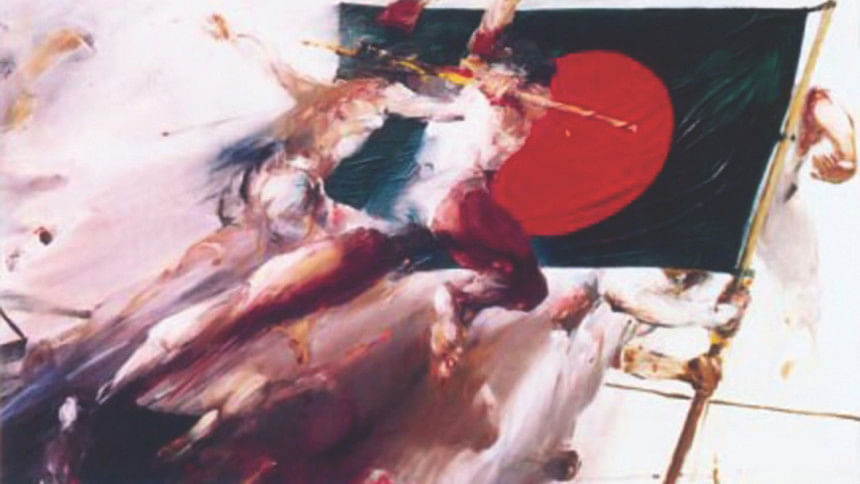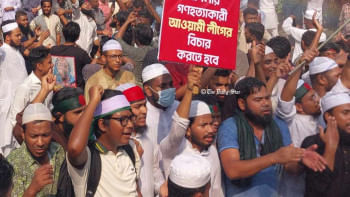We took up arms for freedom, they took up arms for genocide

Every struggle for freedom and every instance of independence of a country usually comes at a huge cost. We are among those countries of the world who appeared to have paid a much higher price than many others. As we celebrate our independence day we cannot but mourn the deaths of our freedom fighters and more so the victims of genocide which is now so indelibly linked with any celebration of our Independence.
We know of several instances in history of massacre of civilians by an invading army. We also know of atrocities committed in tribal and ethnic wars. However the genocide that was committed by the Pakistan army on the unarmed civilian population of the then East Pakistan can only be described as something beyond our imagination.
We were aware that West Pakistanis did not know much about us nor did they think much of us. But we had very little idea that they hated us so much as to launch a mass killing just because the election of 1970 did not go the way they had planned and we won resoundingly enough to demand power to govern the whole of Pakistan.
The possible comparison of our genocide would be the holocaust committed against the Jews in Germany by the Nazis and the killing of civilians in Cambodia by the Pol Pot regime. The comparison is relevant both in terms of the huge number of people killed and by the fact that a country's own army was used to kills its own people.
The government that was voted to power in Germany turned around and killed millions of its own citizens. In the case of Cambodia the victors of revolution that people welcomed turned around and started systematically killing ordinary people in the name of eliminating inequality. So also in our case, the army that was fed, clothed, armed and trained by funds generated by our agricultural and industrial products and taxes, was used to kill us.
How could an army that was created to protect us kill us so brutally? They could because the 'intellectual preparation' started much earlier. The point of this article is to assert that though physical elimination of the Bangalis may have started from 25th March 1971, the murder of Bangalis in terms of culture, literature, tradition, intellectual ability and whatever was their collective heritage started much earlier, from the very inception of Pakistan as a country.
Our genocide was not just to 'eliminate' people who wanted independence but an 'ethnic cleansing' comparable to those that occurred in the Balkans and that is occurring now in the occupied territories of Palestine.
Bangalis were killed not only because we took up arms against the state of Pakistan but also because of who we were- Bangalis. In fact that was the crux of the issue-'we were not good Muslims' and hence we would have to be racially 'improved' first by reducing our numbers and then through forced 'relations' of our women with the 'real Muslims' from Pakistan. The indiscriminate rape of Bangali women during the nine months of war was a result of this policy. Thus a whole new 'class' of citizens were to be 'procreated' so that we 'Bangalis' become better Muslims and as such better citizens of Pakistan.
The ferocity and brutality of the genocide and its all encompassing nature could not have resulted only from a political decision to 'suppress' a rebellion. It came from a deep-seated sense of 'cultural and racial superiority' bred over decades of nurturing a narrative that 'Bangali Muslims were some sort of an inferior version of Muslims' as most of them were locals and converts as opposed to West Pakistani Muslims having 'Arab' blood.
The Pakistanis identified our cultural heritage to be the most significant obstacle to our being 'genuine Pakistanis'. As most of our ancestors converted to Islam and as Bangalis we had significant parts of our cultural heritage that predated the coming of Islam to Bengal, therefore we were 'polluted' with cultural 'impurities' that needed to be 'eliminated' before we could really become good Pakistanis.
The above narrative does not stand to historical scrutiny. The cultural heritage of Bangalis of East Pakistan was far richer, more complex and varied with Islam forming an intrinsic part of it all. But Pakistanis were never interested in the history that showed us in a different light than the one that they created to justify their 'superiority'.
So from the very beginning, the rulers of Pakistan targeted our culture as something that had to be suppressed, if not destroyed, to build a strong Pakistan. Thus within less than two years we had Pakistan's founder arrogantly declaring that "Urdu and Urdu alone will be the national language of Pakistan", a language that he himself could not speak.
Everything about our culture was anathema to them. People of West Pakistan were taught that Bangali culture was nothing but an extension of Hindu religion and our love for and attachment to Bangali culture and literature prevented us from appreciating what great opportunities Pakistan as a country provided for us to regain the glory of Islam and Muslim Empires.
Ingrained deep within the Pakistani mindset was a deep-seated hatred for what we stood for as Bangalis. This needed to be 'changed' before we could be accepted.
The history of our 24 years with Pakistan bears ample proof of it.
The genocide of 1971 was the most brutal and cruel manifestation of a thinking that Pakistanis nurtured and something that was hammered into their thought process, especially in the mind of its army. Otherwise the army of one's own country-which it was till the 25th night- could not have killed innocent unarmed men, women and children as the Pakistani army did starting from that fateful March night.
The racism behind the genocide of 1971 has not been sufficiently focused on and not enough research has been done on the mindset of the Pakistani leadership, especially that of the armed forces, to expose the nature and extent of the cruelty of a country's 'own' army killing its majority population.
As we celebrate our independence today we must introspect why we needed to separate ourselves from Pakistan in 1971 and what would have happened to us as a people, as a culture and as a historic entity had we not gained our independence. It is not only that we are far better off with our "Independence" but that we would have been obliterated as a culturally distinctive people if we did not become so.
The writer is Editor & Publisher, The Daily Star.

 For all latest news, follow The Daily Star's Google News channel.
For all latest news, follow The Daily Star's Google News channel. 



Comments